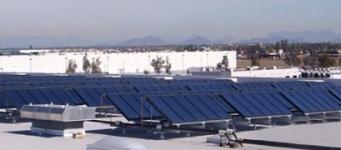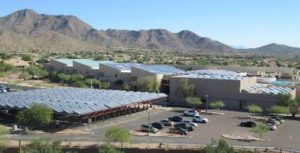Solar Thermal Bankable – yes or no?
January 7, 2013
 It is not easy at all to persuade third parties to finance large-scale ESCO (Energy Service Company) projects for solar thermal: The financial sector needs to become more aware of solar thermal technology and its related projects. This is the lesson that Austrian company S.O.L.I.D. learned after looking for investment partners for several months. In the first half of 2012, S.O.L.I.D joined a number of projects, in which the Austrian company takes over the role of the energy provider. The clients had already confirmed these projects, which are worth altogether EUR 10 million. So, S.O.L.I.D. asked Barry Durham, founder of Critical Mass Capital in Little Rock, Arkansas, to be its capital advisor. Durham contacted 17 European and US banks, four private investment funds and two investment bankers in the United States – without any success! In the meantime, some clients have already halted their project; for some of the others S.O.L.I.D. is still negotiating with banks. The photo shows a large process heat installation of S.O.L.I.D. at Gatorade, a subsidiary of US-American soft drink producer PepsiCo.
It is not easy at all to persuade third parties to finance large-scale ESCO (Energy Service Company) projects for solar thermal: The financial sector needs to become more aware of solar thermal technology and its related projects. This is the lesson that Austrian company S.O.L.I.D. learned after looking for investment partners for several months. In the first half of 2012, S.O.L.I.D joined a number of projects, in which the Austrian company takes over the role of the energy provider. The clients had already confirmed these projects, which are worth altogether EUR 10 million. So, S.O.L.I.D. asked Barry Durham, founder of Critical Mass Capital in Little Rock, Arkansas, to be its capital advisor. Durham contacted 17 European and US banks, four private investment funds and two investment bankers in the United States – without any success! In the meantime, some clients have already halted their project; for some of the others S.O.L.I.D. is still negotiating with banks. The photo shows a large process heat installation of S.O.L.I.D. at Gatorade, a subsidiary of US-American soft drink producer PepsiCo.
Photo: S.O.L.I.D.
“Solar thermal installations are perceived to be less financially attractive than photovoltaic or wind energy projects. There is a lot of education that must take place at American banks,” Durham sums up his experiences. The financial institutions have dismissed all of the different arguments. “The larger financial institutions told us that EUR 10 million is too small to get involved in a new sector,” Durham states one of the standard answers which he received. The banks said to tackle the market and educate bank employees about the new technology segment, the investment would need to be as much as USD 100 million. Others confirmed that solar thermal was simply new to them. They admitted that the sector was too small and that they would need more exposition from the solar thermal industry to agree on investments in this sector.
Altogether, the solar industry has to show more confidence when negotiating with the financial sector. “Our projects meet several requirements that banks have,” Christian Holter, Managing Director of S.O.L.I.D., says. He adds that the key success factors of large-scale solar thermal systems are “a proven technology with a history of 20 years and reputable customers from the industry or the public sector.” In addition, ESCO projects are based on long-term agreements which guarantee credit refinancing. The fixed solar heat prices mentioned in these agreements consider the inflation rate, so that the commodity price risk is limited. “This is exactly what banks want,” says Holter.
S.O.L.I.D. is worldwide one of the most experienced project developers in the field of commercial large-scale solar process heat and solar cooling installations. The 16-people team in Austria has planned and installed over 200 large-scale solar thermal systems on all five continents and operates a great number of the projects themselves. Among the most famous projects, which can also be found in the news section of this website, is Gatorade’s pre-heating system. Gatorade, which is a subsidiary of US-American soft drink producer PepsiCo, has already extended its installation three times to a maximum of almost 3 MWth (3,793 m²), because the company was very satisfied with its performance. S.O.L.I.D. is also responsible for one of the largest solar cooling systems worldwide, the system on the United World College (UWC) in Singapore. The installation consists of a collector area of 3,872 m² and an absorption chiller machine with 1.5 MW. The United World Colleges are international schools with an emphasis on social and environmental issues. The third project is the solar thermal installation on top of a huge banking complex in Lisbon, Portugal. The solar cooling plant, which the national bank Caixa Geral de Depósitos (CGD) commissioned S.O.L.I.D. to design, has a collector area of 1,579 m² of collector area and a cooling capacity of 545 kW.
More information:
http://www.solid.at
http://www.criticalmasscapital.com


